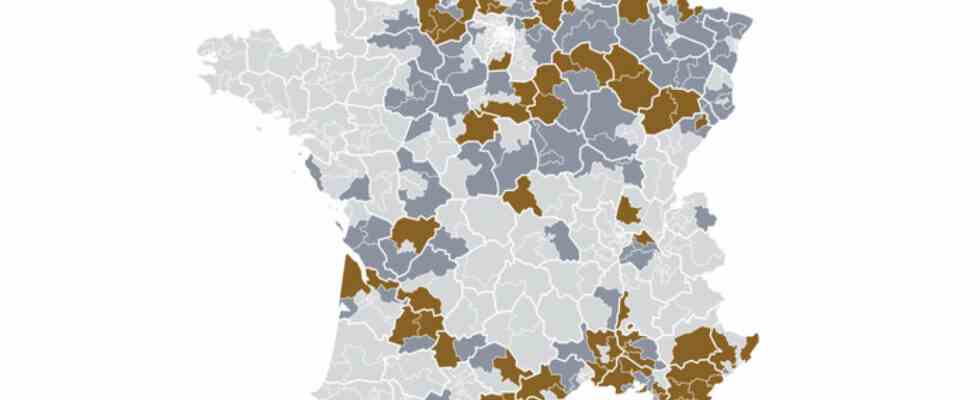While most of the attention during this legislative campaign focused on the left-wing alliance, the most spectacular result of these elections happens to be that of the National Rally (RN). The party of Marine Le Pen managed, Sunday, June 19, to send 89 deputies to the National Assembly, a number hitherto unequaled, which will give more powers to the far right.
With 89 elected in 2022, the RN multiplies by eleven its result of 2017 (8 deputies had been elected) and by almost three that of 1986, the year when the party, which was then called National Front, had made a sensational entry into the National Assembly, thanks to the proportional vote wanted by François Mitterrand, never reapplied since.
A historic breakthrough in the number of seats
This score is all the more striking as the method of voting in legislative elections has historically never favored the RN, as the party has long lacked local presence. The fact that the legislative elections have followed the presidential election since 2002 has never favored political opposition to the elected president, who could take advantage of his recent legitimacy acquired by the ballot box to claim a large majority in the Assembly.
The RN had so far always struggled to qualify in the legislative elections, even after having obtained good scores in the presidential election, and even more to win duels or triangular, even in 2017, when the party of Mme Le Pen had gathered 21.3% of the votes in the presidential election, he had won only 8 of the 120 constituencies where he had qualified, or 6.6%. In 2022, the RN wins 89 of the 208 constituencies where it was present in the second round, a success rate of 42.8%.
The effect of a collapse of the Republican front
The “republican front”, which pushed the other political parties to block against the extreme right, did not work as much as in the past. Estimates published by the polling company Ipsos confirm that the RN was able to benefit from unprecedented vote transfers: during duels RN-Nupes or RN-Ensemble!, voters of the right-wing party Les Républicains reportedly voted 58% on the abstention or white vote, 30% on the RN and 12% on the Nupes.
Unlike previous elections, the party’s vote base is maintained between the first round of the presidential election and that of the legislative elections a few weeks later. While its reduction between these two elections since 1988 is between 25% and 60%, it has fallen “only” by 19% in 2022.
A profile of elected officials already established locally
One of the explanations for this good score of the RN can be found in the progressive constitution of a local anchorage. The parliamentary group which will make its entry into the National Assembly on June 28 is made up of a majority of men and women (they are 33) who already have political experience. Among these 89 elected officials, only 20, according to the counts made by The worldwon an election for the first time.
All the others hold local mandates as municipal, departmental or regional councillors. Three of them, Hélène Laporte, Julie Lechanteux and Joëlle Mélin, are already MEPs and will also have to give up one of the two mandates. Finally, some newly elected deputies will not be lost in the National Assembly, because they have been parliamentary assistants. This is the case of Florence Goulet, who remained Henri Guaino’s parliamentary attaché for twenty years.
Geographically, the RN consolidates and expands its positions in its strongholds, in the north and east of France, as well as around the Mediterranean. The party also managed to impose itself in geographical areas such as the valley of the Garonne (Gironde, Dordogne, Lot-et-Garonne), the Seine (Eure) or the Loire, where Marine Le Pen was came out on top in the first round of the presidential.
The RN more influential than ever in the National Assembly
The legislative elections on 19th June will allow the Rassemblement national to have a parliamentary group for the second time since 1986. With a group of 89 members, the party will have plenty of speaking time in the hemicycle, since it is distributed according to the size of the groups. He can also:
- sit on the conference of group presidents;
- sit on the eight standing committees of the Assembly (in proportion to its weight);
- accede to the presidency of certain standing committees;
- sit in the office of the Assembly (vice-presidents, secretaries, quaestors);
- set the agenda regularly (at least three times a year);
- create a commission of inquiry or a fact-finding mission (once a year maximum).

